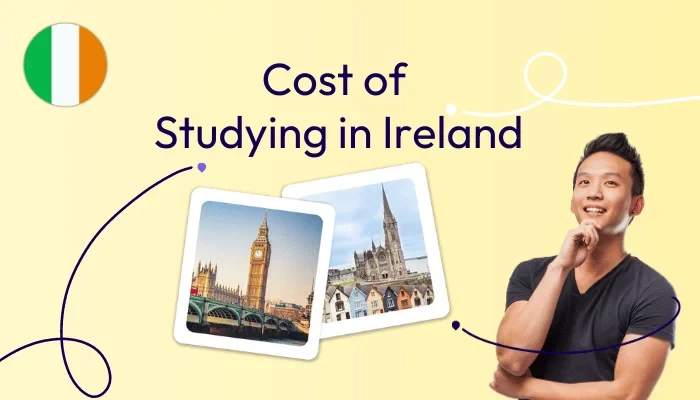What are the costs of studying in Ireland?

Ireland, the land of rolling green hills, captivating traditions, and vibrant culture, is a top study destination for international students with its world-class education system. But before you pack your bags and dream of savouring beef stew in a cosy cafe, it’s crucial to understand the finances of studying abroad.
This comprehensive guide will unveil the cost of studying in Ireland while pursuing your academic dreams. We ensure that you’re well-equipped for a successful and enriching adventure. So let us get started!
Tuition Fees
The cornerstone of your financial planning is tuition fees. Depending on the university, your chosen course, and program level (undergraduate or postgraduate), fees can vary significantly. Here are estimated figures to get you started.
- Undergraduate Courses: You can expect a range of EUR 8,000 to EUR 20,000 annually. Humanities, Education, and Arts programs fall on the lower end, while subjects like Engineering, Business, and Management can cost more.
- Postgraduate Courses: For popular fields like Engineering, Computer Science, and Business, anticipate tuition fees between EUR 9,950 and EUR 35,000 per year.
These are just estimates, so always check the specific program fees on the university website. On top of tuition, some universities might charge additional fees like examination or registration charges. Moving ahead let us now explore the cost of a student visa.
Student Visa Cost
To legally reside in Ireland as a student, you’ll need to secure a visa. There are two main options.
- Type C Visa (Short-Term Study): Ideal for programs lasting less than three months, this visa costs EUR 60.
- Type D Visa (Long-Term Study): This visa caters to programs exceeding three months and also costs EUR 60.
Now, let’s explore the different types of accommodations and their respective costs after understanding the visa expenses.
Types of Accommodations & Costs
Accommodation is a significant ongoing cost while studying abroad. Here’s a breakdown of the various options in Ireland, along with their estimated monthly costs.
University Hostel
- A budget-friendly choice, offering single or shared rooms within the campus.
- You can expect to pay between EUR 200 and EUR 300 per month.
On-Campus Living
- This option provides more amenities and independence compared to hostels.
- The monthly costs range from EUR 300 to EUR 650.
Private Hostels/Apartments
- Living outside the university campus can offer more flexibility but may come at a higher cost.
- Renting a studio apartment could set you back between EUR 400 and EUR 900 per month while sharing an apartment with roommates can bring the cost down to EUR 450- EUR 550 monthly.
With accommodation costs come other expenses, so let’s proceed to explore the additional cost of living without any delay.
Cost of Living
Beyond accommodation, everyday living expenses need to be considered. Here’s an analysis of essential costs to keep in mind.
Food
- Enjoying delicious Irish cuisine at restaurants can add up quickly.
- Consider budgeting around EUR 30-50 per day for restaurant meals.
- However, if you’re a savvy cook, grocery shopping can bring your food expenses down to EUR 250-350 per month.
Travel
- If you live on campus, transportation costs might be minimal.
- For off-campus residents, a monthly bus pass can be a budget-friendly option, costing around EUR 50-55.
Utility Bills
- Electricity, gas, water, laundry, and internet are essential utilities.
- Budget an average of EUR 550-1000 per month, with internet adding EUR 50-60 monthly.
There are other costs like stationery, medical insurance, occasional outings, and social activities. You can allocate roughly EUR 200-300 per month for these miscellaneous expenses.
After reviewing these expenses, you may feel a bit overwhelmed. However, do not fret! We have an excellent solution for you.
Exploring Overseas Education Loans
For many students, pursuing an international education often requires financial aid. Here’s a glimpse into the types of overseas education loans to help bridge the cost gap.
Secured vs. Unsecured Loans
Secured loans require collateral like property, while unsecured loans rely solely on your creditworthiness. However, to make a well-informed decision it is important to consider several essential factors that we have discussed ahead.
Factors to be Considered
Here’s a breakdown of some important factors to consider when applying for a collateral or collateral free education loan to study in Ireland.
Interest Rates
The interest rate on your education loan will vary depending on the lender you choose. Generally, government banks offer the most competitive interest rates, followed by NBFCs and private banks.
- Government Banks: 9.70 – 10.50
- Private Banks: 10.5%- 13.25
- NBFCs: 11.5% to 13.75%
- International Lenders: 10.50% – 13.00%
Processing Time
The processing time is the duration required for the bank to approve the loan amount. Below we have mentioned the turnaround time for all the financial lenders.
- Government Banks: 20 to 25 days
- Private Banks: 10 to 15 days
- NBFCs: 7 to 10 days
- International Lenders: 8 to 10 days
Borrowing Limits
The borrowing limit for your education loan will depend on the type of program you’re pursuing and the lender you choose. Below we have summarised the borrowing limits offered by different lenders.
- Government Banks: 7.5 Lakhs – 1 Cr
- Private Banks: Up to 75 Lakhs or more.
- NBFCs: Up to 75 Lakhs or more.
- International Lenders: Up to $100,000
Repayment Tenure
The repayment tenure for education loans in Ireland ranges from 10 to 15 years, and it remains fairly consistent across numerous types of financial institutions.
Pre-Visa/Post-Visa Disbursement
There are two main options for loan disbursement:
Pre-Visa Disbursement:
- The loan amount is disbursed before you secure a visa.
- This can help pay initial tuition deposits or first-semester fees.
- However, not all lenders offer pre-visa disbursement, so be sure to check with your chosen lender.
Post-Visa Disbursement:
- The loan amount is disbursed after you obtain your visa.
- This is the more common option, and it is suitable for students who receive visa confirmation before requiring loan funds.
In a Nutshell
We can indeed say that Ireland is the best country to study abroad for Indian students, and students from all parts of the world. It promises an enriching experience filled with academic excellence, cultural exploration, and breathtaking landscapes. While the costs may seem a little overwhelming at first, this comprehensive guide has equipped you with the knowledge to steer the root of financial aspects.
From budgeting for tuition and accommodation to exploring overseas education loan options, you’re now empowered to make informed decisions. So, with careful planning and resourcefulness, your dream of studying abroad can become a reality. Also, if you need comprehensive loan assistance, you can reach out to overseas education loan advisors and get complete aid. So, book a counselling session now!
Related Blogs
Overseas Education loan Insurance







